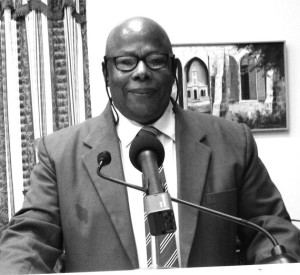
There has been a slight increase in the 2015 budget of the Government of Anguilla over the 2014 figure.
That is according to the Budget Address delivered in the House of Assembly by Chief Minister and Minister of Finance, Mr Hubert Hughes, on Friday, December 12.
Hughes told the House that the 2015 recurrent expenditure was projected to amount to EC$192.17 million, about 4.9 percent above the EC$183.24 million which was the estimate of the 2014 budget.
He explained the components of the 2015 recurrent expenditure as including the following: wages and salaries $86.79 million; retiring benefits: $10.03 million; interest payments on public debt: $9.32 million; goods and services: $43.37 million; and current transfers/contributions to statutory corporations: $42.65 million. The allocations to the various ministries and departments, including the Governor’s Office, are set out in the budget address.
The Chief Minister’s 19-page budget address, thought to be much shorter that last year’s, gave a further summary of the 2015 figures, including recurrent expenditure, recurrent revenue and the capital budget.
The appropriate extract from the address is a follows:
“Madam Speaker in sum, I now restate that Recurrent Expenditure for 2015 is budgeted at EC$192.17 million and I now turn my attention over to recurrent revenue.
4. RECURRENT REVENUE 2015
Madam Speaker, the revenue estimate for 2015 is EC$192.28 million. It is 4.82 per cent higher than the 2014 estimate of EC$183.43 million. The projection is based on anticipated increases in revenue resulting from improved collection of arrears with the establishment of the Collections Unit and some activity related to tourism development projects. Madam Speaker, there will be no increases in taxes or the introduction of new taxes in 2015.
Madam Speaker, the following presents a summary of the revenue composition in 2015.
32.50 per cent of total recurrent revenue is projected to come from Duties and is estimated to total EC$62.49 million. Another significant contributor to revenue is taxes on domestic goods and services, accounting for some 24.43 per cent of revenue or EC$46.96 million. Of that total, Accommodation tax accounts for EC$18.95 million and Stamp Duty EC$12.20 million. The Interim Stabilisation Levy is projected to collect EC$13.50 million and is 7.02 per cent of the revenue estimate. Tax on Property is estimated at EC$5.25 million which represents 2.73 per cent of the recurrent revenue estimate. Taxes on international trade and transactions continue to be major source of revenue and in 2015, anticipated collections are EC$19.31 million or 10.04 per cent of revenue.
Non-tax revenues account for some EC$30.34 million or 15.77 per cent of revenue of which Fees, fines, and permits account for EC$21.14 million.
5. CAPITAL BUDGET
Madam Speaker, despite the tight fiscal constraints, we place particular emphasis on carefully selected projects that serve the dual role of constructing and repairing much needed infrastructure and facilitating our developing sectors all in a bid to promote economic activity and support economic development.
Overview of 2015 Capital Budget
Madam Speaker, the proposed Capital Budget for 2015 is EC$19.81 million and the anticipated sources of funds include Private Grants that will finance Literacy Development and the remainder of the UK Government grant funds that will finance the Adrian T Hazell Primary School Redevelopment Project, Minor Education Projects, Telecommunication Tower Replacement and the Fire Station and Air Traffic Control Tower Development.
The remaining Loan and Grant from the Caribbean Development Bank will continue the on-going development of the Anguilla Community College. Our students must be nurtured and educated in an environment that is conducive to learning.
Throughout the year it may be necessary to dip into Reserves to support the most crucial equipment and facility needs in the area of Healthcare and we also hope to secure the assistance of our local corporate partners in this regard.
The European Development Fund of the European Union will once again finance the remainder of our most basic capital requirements and they have also been approached to support the Development of Anguilla’s Long Term National Development Plan – the joint vision for the development of our nation.
These investments represent difficult tradeoffs between funding programmes and/or capital investments alongside the need to exercise fiscal prudence. Going forward we will continue to make the disciplined choices to maintain fiscal sustainability while still providing the quality programmes that Anguillians deserve and have come to expect.”








